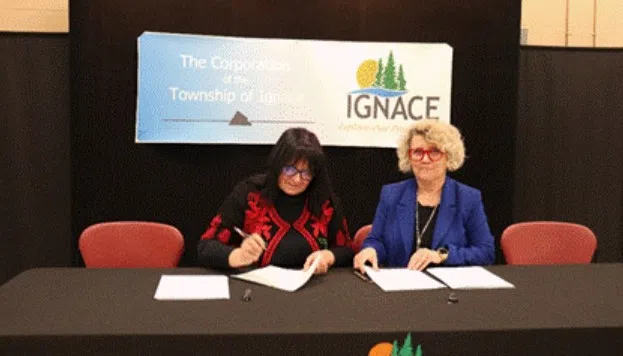
Ignace Mayor Kim Baigrie (left) and NWMO President Laurie Swami (Right) sign what the township calls a "historic" agreement on March 18th 2024 (Supplied Photo)
Ignace is set to host its second meeting to discuss being home to a nuclear waste disposal facility.
Council passed a unanimous decision to open up the community to the possibility of allowing it to be built.
“We have Canadian representatives that are ready to tell their stories and we are so pleased that we have over 40 exhibits who will be on the ground and providing factual and critical information about the nuclear industry, safety in transportation, this proposed deep geological repository and the opportunities that are associated with it,” said Mayor Kim Baigrie. “But we don’t stop there, we also have invited those who are presenting the potential challenges of this project, and their voice must also be heard”.
A group of concerned residents known as Environment North will be at the event providing information on the dangers of nuclear transportation.
The group hopes to see the Nuclear Waste Management Organization (NWMO) adopt the waste proximity principle which leaves the waste to as close to the point of generation as possible.
They want to see the principle adopted because the organization feels no nuclear transportation is safe, and the problem begins with the shipping containers.
“They have four tests, they have a puncture test, and a drop test, but both of those tests don’t use the actual size of the container, they only use 1/2 size models and or 1/7 size models, and so they only use models,” explained Environment North, Nuclear Lead, Dodie LeGassick. “The third test is the thermal test and the fourth test is the immersion test into water and for those they just use computer modelling or analysis, so they’ve acquired certifications for the used fuel transportation package, but the testing is ridiculous and it’s not real like the actual test, so the containers are not safe.”
To transport the waste the containers would need to be loaded onto a truck or train and likely both to reach a nuclear repository. “So when it comes to nuclear safety there is not an element of safety in terms of transportation,” added LeGassick.
LeGassick also stressed that there are over 200 radioactive isotopes in a nuclear fuel bundle set for the repository, including Cesium-137, and Strontium-90 which are both water-soluble and could have a catastrophic effect on the environment if a spill occurred.
“Any municipality along the shipping route to a potential repository in Ignace from southern Ontario should have concerns about the potential of Ignace approving the repository,” according to the group.
Transportation is not the only concern the group has expressed, as they highlight that there has yet to be a deep geological repository for high-level nuclear waste to find success anywhere in the world.
A deep geological repository is typically described as a series of tunnels and rooms/caverns several hundred metres below the surface using a multiple-barrier system, using a mix of engineered and geological barriers that are expected to work together to contain and isolate the radioactive elements.
The event will take place Friday and Saturday at the Ignace Recreational Centre.
For residents in the region who cannot make the event, Environment North is hosting their general meeting on April 25th at the Current River Community Centre, where the conversation on nuclear waste will be continued.
The potential hosting agreement signed by the town of Ignace means it’s time for residents to consider the implications of moving forward with the willingness to host process. The final decision is expected by council by mid-2024.
